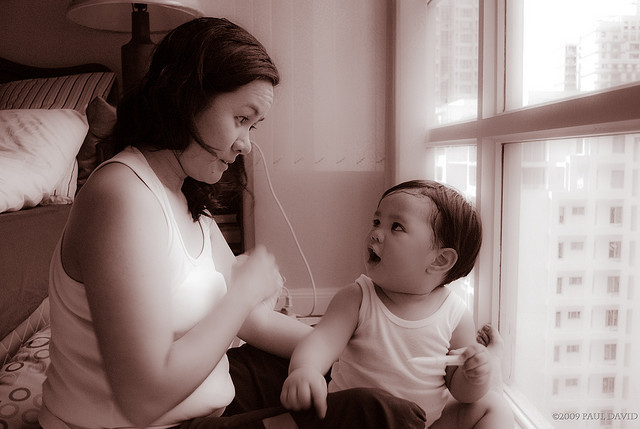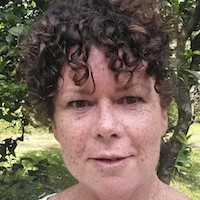
“Hi Mom.”
Two words said into the receiver, but in those two words there was much more. There was audible pain, audible fear. There was some trepidation, a lot of confusion and torment.
Truthfully, I still can’t even name everything I felt that afternoon—everything that my voice must have conveyed. My mom was calling me in Barbados to wish me a Happy 20th Birthday, but the sound of my voice precluded any of that.
“What’s wrong?” she asked. There was a pause.
“I have something to tell you,” I said, barely holding back the tears. I didn’t know how to tell her what I had to tell her. I had gone over this conversation in my head a hundred times in the past couple of days and there was no easy way to begin. I seemed stuck to the hard, sticky chair I was sitting on. I felt choked, and not by the stagnant afternoon air.
The words were hard to get out. I knew I had to just say it. “I’m pregnant,” I said. Another pause. This was back in 1987, when a long distance call from Maui to Barbados wasn’t exactly static-free, or without delays while the words traveled from one part of the world to another.
But I knew she had heard me.
I knew what I had just told her was weighty enough that a pause was expected—deserved, even.
“Okay,” was her first response. I was already aware that my mom would accept everything about me, and love me through all of it. But I was still terrified to say those words out loud to another human being. It almost became more real at that point than when, two days earlier, I had seen the little beating heart inside of me on the ultrasound.
The doctor’s staff hadn’t drawn blood or tested my urine. They just took me straight to the ultrasound machine. I don’t know why they did it that way, but I do know that seeing a little heart beat inside of me was a shocking way to receive the news of an unplanned pregnancy.
I started bawling into the receiver at that point, feeling the sweet release of finally sharing this news that I had kept to myself until then, trying to guard it from judgment. The only judgment it had been given was my own and I wasn’t kind to myself. I rarely was back then.
“Okay,” she said again.
“I don’t know what to do Mom,” I said.
“What do you mean?” she asked.
“Well, I can’t really have the baby. I think you know who the father is.” My mom did know who the father was. She’d met him when she was still in Barbados a couple of years earlier. She knew our relationship was based almost solely on a physical connection. She knew there were other women. She knew that I couldn’t count on him to provide any kind of stability—that I couldn’t count on him for anything.
What she didn’t know, the fact that was making my heart its heaviest, was that I felt like I couldn’t count on myself. That was the truth about how I felt, and that truth had turned into a hole in my center—it was growing and eating me up. I knew what I was capable of, and raising a child by myself (in fact even raising a child with a fully participating father) wasn’t one of those things.
I’d dropped out of high school when we’d come to Barbados, about three-and-a-half years earlier, to visit my Grandma, who had cancer. She had since passed away, and I could have returned and finished school when my mom and my brother went back to Maui. But I chose to stay in Barbados. I chose it for the endless nights of partying, the fact that there was no drinking age, the fact that I was a bartender at 16-years-old.
I had the freedom to do what I wanted. The problem was, what I wanted to do was nothing constructive nor worthwhile. At the time I was incapable of looking into the future and seeing anything good for myself. Somewhere along the way I had gotten lost.
Anything that I had once believed about myself that had value was a distant memory. I had never voiced all of these things to my mom, but she was my mother—she knew without knowing. “Kristin, if you want to have the baby, you should have the baby. We can do it together.”
I could hear in her voice the longing to take away my pain, but I could also hear a little of the fear that I felt. I knew she didn’t have the answers either. But what she was saying was that we could figure it out together. That if this was what I chose, I wouldn’t be alone. My whole being expanded when I heard those words. The heaviness that had been pressing on me like sand bags was gone.
It was the first time I had allowed myself to think of the possibility of keeping this child, of raising it, of loving it and letting it love me. It was so rich, this feeling—this possibility. It filled me up. “Really?” I asked, needing more reassurance and wanting so badly to believe her.
“Of course, Kristin. Yes, of course,” she said. I told her I would think about it and let her know what I wanted to do. But I know now that this was precisely the time that I decided, because I felt something right then that was a little foreign to me, something I couldn’t name.
It took years before I was finally able to name it. Its name was self-respect.
It turned out that I was right about his father not being someone I could count on. But I was wrong about not being able to count on myself. My son brought that gift with him when he entered this world. In fact he brought it with him that very afternoon. The afternoon when, with my mother’s help, I dared to dream of myself in a different way.
In the process of having this child and raising him on my own, I saw that I could rely on myself.
In teaching him to respect himself, I gained respect for myself. In showing him how to be kind to himself, I learned how to be kind to myself. I had to grow up, and act like someone’s mother.
We grew up together.
I had to change what I wanted for myself, because what I wanted for him was so much more than that. The honor of being this child’s mother has not been lost on me.
When Alex was about three or four-years-old, we lived in a quiet duplex in the sleepy little town of Makawao, on Maui. The yard was small, mostly flowering trees that make a Hawaii home smell beautiful, but leave little room to play outside. So when we were home we spent some time inside playing Super Mario Brothers on Nintendo. I became fairly adept, much to my surprise (to this day it remains the only video game I was ever any good at).
One day a little boy about Alex’s age moved in to the other half of the duplex and soon after he started joining us to play Nintendo. The first time he came over, he watched as Alex and I played, and he was pretty impressed with my skill.
“Wow,” he said. “Your mom’s good, Alex.”
Alex got a distinct look on his face, a look I will never forget. He asked the little boy, “You wish you had that mom—Kristin Hall?”
Although he phrased it in his own funny-little-3-year-old way, I recognized what he meant—he was glad that I was his mother, and he could understand why someone else might want me for a mother as well. I had always been glad that he was my son, but I had never imagined that he would feel the same way.
Never on the summer days preceding that phone call, when I felt only fear, self-doubt, and despair, could I have pictured that the little life inside of me would one day be glad that I was the person chosen to be his mother.
My son is 27 now, and he still gets that look on his face from time to time. It’s the look when he discovers something new about me that he likes, something he is proud of. There has never been anything else that fills my heart as completely as that look. When it happens I take a snapshot of his face with my mind and save it there.
I go back to that snapshot often and revel in the way it makes me feel. I feel like he chose me, and I chose him—I can’t imagine it any other way.
~
Author: Kristin Hall
Editor: Ashleigh Hitchcock
Photo: flickr











Read 0 comments and reply